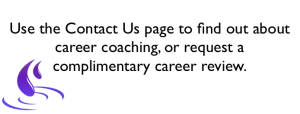
Of course, you never search for a new job in your current workplace
Leaving your job on good terms
In our last post, we talked about the importance of knowing when it’s the right time to leave your current position and find a new job.
I completely agree with Alexia Vernon’s approach (the author of our featured article) and her point that, if you’re planning to leave your job it’s well worth making sure you do so on good terms.
Leaving a job is a phase that you will encounter many times in your life. According to statistics, adults 45 to 55 years old have changed jobs at least 6 times in their working lives on average. What most people don’t realise, though, is that this phase is actually as important as the hiring phase. Or maybe should I say “more important”? How you leave and what you will do during your last days is how people are going to remember you. Hence, if you start being mean to your colleagues or your boss, for example, this is the lasting impression you are going to leave. This is how these people will remember you, regardless of your hard work or how much you have helped the company all these years.
So, let’s assume that you have answered “yes” to Alexia Vernon’s questions, and you are ready to find a new job. How are you going to leave with grace?
Why Is it Important To Leave Your Job With Grace?
First of all, because it is important to yourself and your mind-set (remember the part “The way you walk away from your company is the way you will show up to a new one”?). The sense of accomplishment will boost your confidence levels which is a key ingredient for success.
Secondly, and as importantly, because you don’t want to burn bridges. Even if you hated your job and you don’t want to leave an open opportunity to come back some time. Even then, it is best that you won’t be negative, and you will try to be your greatest self.
I can’t emphasise enough that in a workplace the last impression counts as much as the first impression! You left a good first impression and that helped you get the job, but the last impression is what will help you maintain good relations with your current co-workers and employer : you never know when you’ll meet them again People do change jobs! And of course, a good recommendation or reference from you boss is going to give you more opportunities later on.
The fact is that, once we make a decision to change something in our lives in the near future, our brain tends to get there before we actually take action. We have the picture of that change in our mind and we start considering ourselves more as a part of that picture rather than a part of what is going on right now.
The same thing happens when we decide to leave our company and find a new job. We start being disengaged. We become less productive, maybe miss deadlines, or even arrive late at work.

What to do to leave gracefully
There is a way of leaving your job gracefully, strengthening bridges instead of burning them. The following advice will help you make the transition positive for everyone.
Take the time to plan and get organised
Deciding to leave your job and move forward might seem an exciting opportunity for you, but don’t let your excitement guide you into making any rushed moves. Take the time to think your next steps thoroughly.
Make sure you remain engaged and complete any tasks left
Remember those tasks on your to-do’s that weren’t so important and you had left them for the day you wouldn’t have much work to do? Now is the best time to complete them. Make a list of any other task you need to have completed before you leave, along with the time each one will need. That way you will have a clear picture of how much time you need to accomplish everything before your departure, and it will give you an idea on when it’s the right time to tell your boss. Besides, having a draft plan on your own with a task list on hand will help you with your discussion with him/her.
Clean up your PC
There is always the case of not returning to your office after handing in your resignation. Don’t leave it for the last moment, and of course, don’t forget it! Remove from your computer any personal data (including passwords, emails, photos, etc.). Also, if you are using your company’s email address to login to various websites or social media don’t forget to change it with your personal email address. Another good idea is to erase ‘cookies’ if you have enabled them in order to login automatically. This is for your own protection and security.
Talk to your boss
Your boss has to learn your decision from you and not from someone else first. That’s why it is important not to share your thoughts with any other colleague, no matter how much you trust them. Remember that you want to leave in good terms and in a professional manner.
If you have a preferred date when you want to leave, make sure you give your employer enough time to prepare. It is best to give as much notice as possible. You might need to check your contract or the company’s policies to figure out how much time in advance you should inform your superiors. If there isn’t anything stated in your contract, a month’s notice is generally considered acceptable, although this varies between companies and countries.
When you announce to your boss that you are leaving, do not mention any negative experiences or thoughts you might have about the company. There is no point in being negative; you are leaving after all. Instead, focus on the positive parts of your working relationship. Thank them for the opportunities they gave you to grow and for everything you’ve learnt while working in the company. Now it’s time for you to move on.
Be prepared for different reactions. Of course, there is a chance that he or she will be supportive, but there’s also the chance that they will feel desperate without you, especially if you were working there for many years and they know what an excellent employee you are. They might even propose you a raise in order to keep you. The smartest thing to do is not to accept it. Firstly, because you need to stick to your plan. You decided to leave for a reason. You have dreams; don’t throw them away. Secondly, because you don’t want everyone in the company (including your boss) to think that you manipulated the situation to your benefit.
Discuss your departure plan with him/her and follow their lead
Now that your boss/manager/employer is aware of your plans, you need to create your departure plan with them.
No matter what their reaction was, let them decide what happens next.
If your organisation’s terms and conditions of employment require you to inform the HR department, ask your boss when you should notify them.
The cohesion of the department you’re leaving is now your boss’s number one priority. Consequently, if they don’t want you to share your news with your colleagues yet, you should respect that.
Inform them about your pending tasks and how long it will take you to complete them. Ask them how you can help throughout the transition. Your “job” now is to be as helpful as possible!
Offer to help with the training of the employee who will replace you. If you have someone in mind who could be right for the position, don’t forget to mention it. Chances are that your boss will be more than relieved if the replacement can be done quickly.
Write your resignation letter
Even if you have discussed everything with your boss, the right thing to do in order to show professionalism is to hand in a written notice as well. Your resignation letter should be short and simple. Again, just like when you talked with your boss face to face, do not focus on any negative points. Thank them for everything they have done for you and don’t forget to mention how dedicated you are to make this transition as smooth as possible for your employer.
Inform your co-workers personally
It’s true, a mass email would make it a lot easier, but it is best if you can spend some time with your colleagues and inform them about your departure personally. It is expected that they will ask you a lot of questions regarding your next plans and your decision to leave, but you should keep it vague. Don’t brag about the new position you are after, and of course do not make negative comments about the company or the boss.
Don’t forget to ask for their contact details so that you can keep in touch, and give them yours as well.
Send farewell emails individually and thank those who have supported you during your time in the company.
Help your replacement
Be as helpful as possible. Remember how it was for you when you first came in the company. Your job might seem easy to you but keep in mind that just like with everything new, your replacement will need some time to acclimate.
What you are aiming for here, is to make your departure as painless for the company as possible. There is no need for competition. Your boss already knows that you can’t be replaced. But what you need is to help your replacement to be the next best alternative.
If you are leaving before the new girl/guy comes, make sure that you leave notes for them to help them familiarise themselves with the job. You can write a manual for all the daily tasks. Alternatively, if there is a manual, you may need to make special notes. Tricks you might have found to process specific tasks faster. Or tips that will make their life easier. Try to remember everything you know and note it down (file locations, key contacts’ cell phones or emails, etc.) Also, don’t forget to get a copy of the material you created and give it to your boss.
Remember to collect what you need (that is not property of the company)
Before you leave, make sure you have asked your managers for recommendation letters. It’s better having them now, than trying to reach them in the future.
Furthermore, you might need to collect contact details of clients that you have established relationships with. (Although be careful of any clauses in your contract which limit you from contacting clients for a given period).
Lastly, get an copy of your employment record from the HR department. They should give you one, although you may have to press them for it.
Be sure that you know your rights
Make sure that you know exactly what you are entitled to receive upon leaving (payment, remaining vacation time, pension plans, etc.)
Return company property
Return any company property you might have in your possession. That includes keys, cell phone or laptop provided by the company, documents and anything else that does not belong to you.
Clean your desk
Nobody likes cleaning up someone else’s garbage. Take your personal items with you and throw away anything that no one else would find important. Cleaning your desk and leaving it ready for your replacement to use it, shows your responsibility and your dedication in helping with the transition as much as you can.
Remain positive and engaged until your last day
Commit yourself to be fully focused the whole time. Be there completely until the day you leave. You have so much to do, after all, that this will help you remain engaged.
As time goes by, and the departure day is coming closer, you might feel an impulse to emphasise the negative stuff. To get it off your chest. You should keep yourself from bad-mouthing the company with your co-workers at all costs! There is truly no need for that. Maintain a professional attitude.
If you are required to participate in an “Exit Interview”, the same rules apply. Keep it professional. Emphasise the opportunities you were given and the expertise you gained and mention that is time for you to move on. Bear in mind that anything you say in your exit interview can make it to your boss and follow you everywhere. You don’t want to close any doors definitively. At the same time, if you have constructive ideas for how things could be done differently, it’s worth mentioning them. If you really have had a bad experience, and your boss has been a complete fool, then you need to think about how you can share some of this in the exit interview. Sadly, in my experience, badly managed companies do very little with the results of exit interviews. Companies that are well-managed and genuinely have staff interests at heart do pay attention.
Time to say Goodbye
On your last day at work, you want to make time to say goodbye to your colleagues, supervisors and your boss. Shake hands, smile and say thank you. Provide your contact details and let people know you are available for any questions regarding the job you leave behind. You don’t have to arrange a leaving ‘do’, but it’s a great way to bring people together and leave a lasting (and hopefully positive) impression behind.
Keeping the door open
You were as helpful to your boss and replacement as humanly possible during your notice period. You even thought of ways to take more work off your boss’s shoulders these days to help the situation. Your employer knows that all the extra work you did was out of kindness, good work ethics, professionalism, commitment and responsibility. And this kinds of extra effort is what employers notice. This is what you will be remembered for, in addition to the work you have done, and what your supervisors will be so willing to write in your recommendation letters. These qualities are what set you apart from any other candidate in any future job search.
Make sure to inform them about your availability for taking calls and emails answering questions until your replacement is settled and everything is back on track.
Also, remember that you may not work for that company any more, but both your former employer and co-workers are part of your network now. Be sure to keep in touch after you leave, you never know when they may be handy. Email or call them just to see how they are, and be interested in knowing where they are in their career; inform them where you are in yours. Connect with them via the social media. Connect with everyone on LinkedIn before you forget people or lose track of them.
And of course, in any upcoming job interview, it is important how you will talk about previous jobs. Recruiters will ask you why you left your last job, and it is critical that you remain professional.
.
If you bear all these things in mind, you ‘ll leave your job as gracefully and professionally as possible! And you’ll enhance your personal brand and chance of future career success in the process.

 I’ve just published a new video called How To Use Your Voice For Maximum Impact.
I’ve just published a new video called How To Use Your Voice For Maximum Impact. Great news for women who are committed to their professional leadership development and aim to be bosses! According to Aaron Guerrero’s article in US News, “trends are slightly moving in the favor of females who want to lead“.
Great news for women who are committed to their professional leadership development and aim to be bosses! According to Aaron Guerrero’s article in US News, “trends are slightly moving in the favor of females who want to lead“. Have you sat down with your manager yet to work on a career development plan? The month of January is often the time for your annual career development conversation (for some companies this is done at the of the year, in December, rather than the beginning, or is tied in with the organisation’s financial year).
Have you sat down with your manager yet to work on a career development plan? The month of January is often the time for your annual career development conversation (for some companies this is done at the of the year, in December, rather than the beginning, or is tied in with the organisation’s financial year). Like many of us, I’ve had my share of unsupportive bosses, particularly those who are keen to promote a man rather than a woman. I know that in many societies it’s a real struggle to get recognition as a a professional if you happen to be female. And today I discovered just how bad it is for women managers in Japan.
Like many of us, I’ve had my share of unsupportive bosses, particularly those who are keen to promote a man rather than a woman. I know that in many societies it’s a real struggle to get recognition as a a professional if you happen to be female. And today I discovered just how bad it is for women managers in Japan.